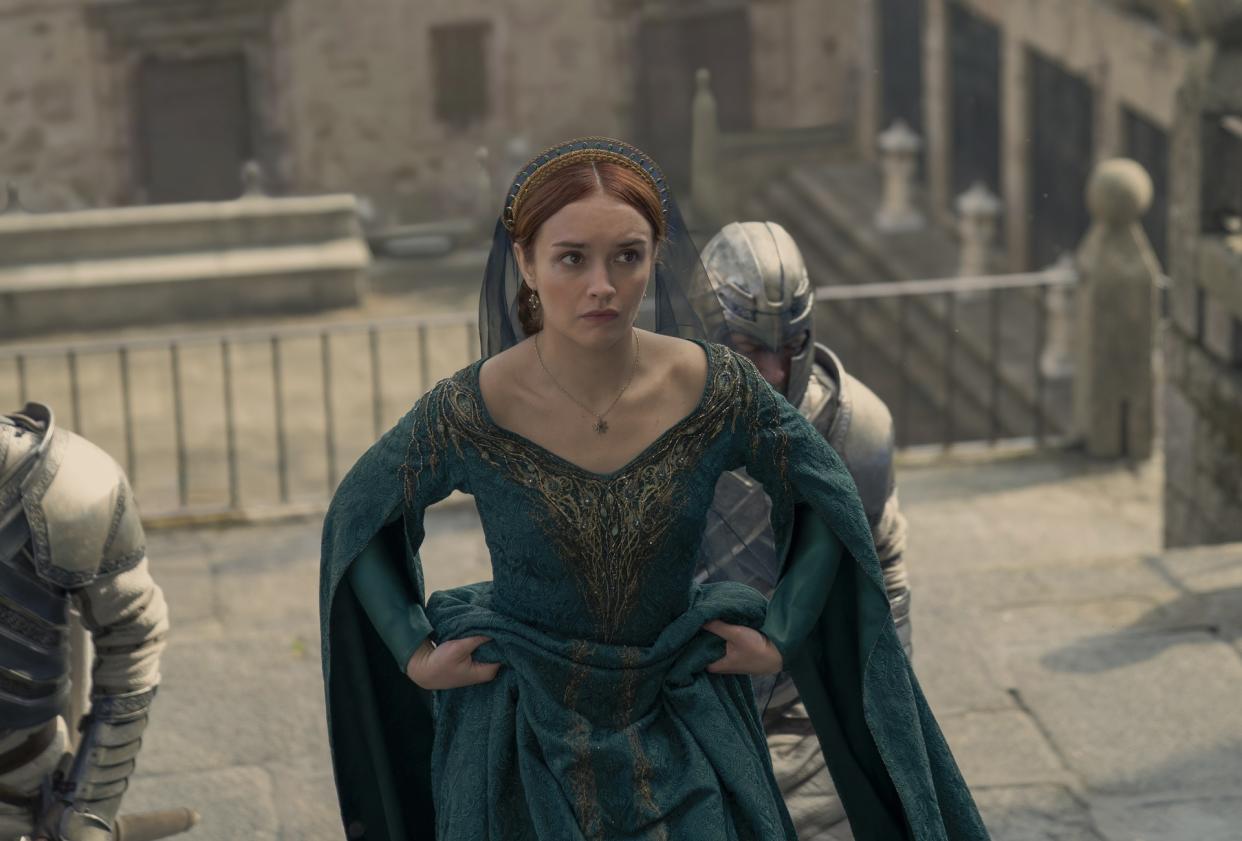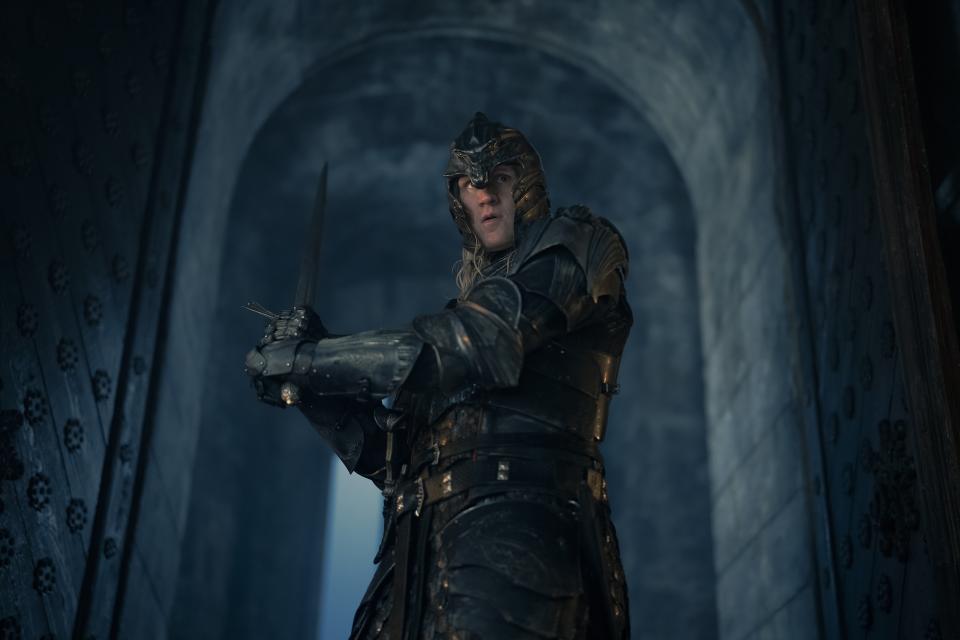‘House of the Dragon’ Ep. 3 Review: Never Send a Man to Do a Woman’s Job

Editor’s Note: The following post contains spoilers for “House of the Dragon” Season 2, up to and including Episode 3.
Is Westeros at war? Sources beg to differ on the answer. There are those who believe it has already commenced, that action must now be taken in defense and retaliation and with survival in mind; yet others, and surprisingly many characters in “House of the Dragon” Season 2, Episode 3, seem to still think the W word is on the horizon, potentially held at bay if they take the right course.
More from IndieWire
Among those is Queen-hopeful Rhaenyra (Emma D’Arcy), under the sweet delusion that her opponents or any detractors in the realm will listen to reason. They didn’t listen when the last king explicitly named her heir, but perhaps they might be swayed on the child murder enacted in her name? Keep dreaming is my advice to the ruler now being called Rhaenyra the Cruel, and she does just that in this episode directed by Geeta V. Patel.
Yet another episode kicks off with tertiary characters in the North, Easter eggs and calculated plot development for “Fire & Blood” readers, even if others can’t tell the Brackens from the Blackwoods (even less so once they’re all dead on the ground). As with Episode 202, we’re reminded that the wider population of Westeros looks at Rhaenyra and Aegon (Tom Glynn-Carney) as figureheads for all their supporters, with Rhaenyra shouldering the blame for Aegon’s son’s death even though she herself had offered neither participation nor consent.
The root issue, not subtly put forth in this episode or indeed the series at large, is patriarchy. In King’s Landing, Alicent (Olivia Cooke) watches with disdain as the King’s small council devolves into shouts, accusations, and undisciplined chaos, with only herself exempt to the hysterics. “House of the Dragon” is walking a tightrope between humanizing and outright absolving both Alicent and Rhaenyra, especially in this episode. With two such strong actors and female characters, there’s fruitful ground in exploring their relationship and motivations without relegating them to sanctified, passive roles. Some of that also pops up later in 203, but as IndieWire’s review of Episodes 1-4 notes, it’s an issue with the season thus far.
On the advice of Rhaenys (Eve Best) — who furtively whispers that Otto’s (Rhys Ifans) orders didn’t kill the Cargylls, that “hotter heads have prevailed” (not all men!) — Rhaenyra embarks on a mission to speak to Alicent; womano-e-womano, no men or Hands or councils or cousins, so that they can stop the war in its tracks. She also makes the choice to send her three youngest sons and Rhaena (Phoebe Campbell) away from Dragonstone, bound ultimately for Pentos with four dragon eggs (three of which will sure look familiar to “Game of Thrones” viewers).
While Rhaenyra plans her own prank (dressing up as a septa to ambush Alicent… so crazy it just might work), Daemon (Matt Smith) flies to Harrenhal on her behalf, haunted by their argument in Episode 202 and also literally haunted by the supremely creepy atmosphere. The horror-movie tone shift — setting, sound, and silence (lack of dialogue anyway) all set it apart from an average “HOTD” sequence, but as Ben Travers hinted in his review, this B plot sports “all the bells and whistles of a stall tactic.” It’s fun to see Milly Alcock reprise her role as young Rhaenyra, as well as a chilling implication that Daemon still sees his wife as that teenage girl, even if she is old enough to be cleaning up his messes (of the beheaded boy Jaehaerys I’ll just say: I am grateful it looked fake).
The less said about Ser Failing Upward Criston Cole (Fabien Frankel) the better, though I must acknowledge that his hair changed mid-season — nay, mid-episode — and that this unexplained cosmetic tweak is absolutely on brand for the character. Trust him to spend the first paycheck after a promotion on a fresh fade during wartime. This guy.
(I will also note that as much as I cannot stand Cole — which is likely by design — Frankel had to limit his Instagram comments because “HOTD” fans have been so cruel to him online, and that is totally inappropriate. Kudos to Frankel for bringing a loathsome character to life, shame on his bullies, and congrats on the new ‘do, Mr. Cole).
Patel is tasked with multiple scenes set in heavy rain, Daemon’s eerie castle crusade juxtaposed with Rhaenys and Corlys (Steve Touissant) being extremely tender (ostensibly having a picnic at a construction site?). Their marriage continues to put most others in the realm to shame and the actors’ chemistry is outrageous.
There’s not a lot of Phia Saban in this episode, but Helaena manages to not only process but contextualize her grief better than anyone around her has or will. She forgives the smallfolk for staring at her during “that horrid procession,” recognizing that their lives are infinitely harder than hers, that they have more than likely lost children or loved ones of their own. By contrast, Alicent’s “The Stranger comes for us all, Queen and commoner” is stripped of that wider empathy — but she means only to comfort her daughter, and she does that by telling Helaena that she has every right to grieve.
This episode does have Glynn-Carney continuing to lean into my favorite version of Aegon, comedic even in the depths of grief as he hits the bars with his boys — he even did his hair (incredible casting to have Kevin ‘KG’ Garry at this bar, best known for hanging at the pub in “Ted Lasso”).
But Aegon immediately reverts to cruelty around Aemond (Ewan Mitchell), a reminder that their brotherly dynamic was never healthy; Aemond was bullied as a child, driven to prove himself by mounting Vhagar even at risk of death; it’s why he has such a chip on his shoulder since claiming the oldest, most fearsome dragon in the realm, surviving something like losing an eye, and being a skilled soldier and kinslayer — even if that final point weighs on him. Drunk and drowning in his own roiling emotions, Aegon finds comfort in abusing his brother, in acting like they’re just boys in the yard again and not adults tasked with ruling the realm, furthering their bloodline, and coping with things they’ve seen and done.

The episode culminates with Alicent and Rhaenyra, together after too long. D’Arcy and Cooke are electric together, it is the tragic irony of this show that they share so few scenes (indeed, this one itself is a departure from “Fire & Blood”). Their dynamic is such that you never doubt the characters’ history, even without seeing it portrayed by Alcock and Emily Carey in Season 1. The body language, the emotion, is all too familiar to adults — especially women — who have formed or lose close friendships which transcend personal history.
It’s not like Alicent and Rhaenyra are friends in the sept, but they aren’t enemies in the same way that they are publicly. They feel completely safe with each other, at least not in immediate danger of bodily harm, and most importantly they’re safe from the cacophony of belligerent followers (mostly men) who surround them the rest of the time. Rhaenyra invokes the male thirst for bloodshed and battle, contrasting it with their own mislike of the war (this isn’t as reductive as “women are peaceful and men love to fight,” but connects back to Season 1’s multiple graphic childbirths and to what Rhaenyra said in Episode 2. She told Daemon “I have challenges enough” without his transgressions, and that goes here too).
Shockingly, and intriguingly, we watch Alicent digest the fact that she placed Aegon on the throne as a result of miscommunication. I’m not getting my hopes up, but this opens the door for Alicent to shift loyalty, or at the very least to relinquish the vigor of her cause. She convinced herself since Viserys’ death that what she heard was absolute, but there’s humility and terror in her eyes when she realizes her the truth.
Still, the episode doesn’t end with any change of heart or shred of hope. Alicent not only believes that war has befallen, but that it’s too late to stop its progress without letting the fiery bloodshed run its course. Where previously she was stubborn — wanting justice for Aemond’s eye, putting Aegon on the throne — now she is defeated, doubling down because at least if she backs her own side, she might survive.
Grade: C+
“House of the Dragon” airs Sundays at 9 p.m. on HBO.
Best of IndieWire
Sign up for Indiewire's Newsletter. For the latest news, follow us on Facebook, Twitter, and Instagram.

 Yahoo News
Yahoo News 
